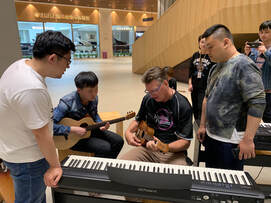|
All the news from Musical Futures International
|
 Ken Owen is one of the Directors of Musical Futures International. In this blog post he reflects on delivering workshops for students, teachers and parents as part of The National Music Education Conference in Beijing. This year the conference had the theme 'Happy Learning' and here ken reflects on how the core principles and aims of Musical Futures sits within the context of Music Education in China. Ken will be part of the Musical Futures International delivery team at workshops in Singapore, Taiwan, Manila and across Australia in 2019-20 Happy learning and student choiceThe keynote speeches at The National Music Education Conference in Beijing, May 2019 really resonated with me as I considered how important it is to me as a teacher that learning music can and should be fun. Yet in China we often come up against parental expectations that in order to be valuable, learning should be serious, strict, a good use of the childrens' precious time that is filled with study and homework, something to be striven for. Most of all it should be delivered formally with the transfer of expertise from teacher to pupil and measured by graded music exams and certificates to mark progress, a full set to be collected by the time the demands of homework mean there is no time for instrument practice any more. That's not really my idea, of fun as a musician who started out learning informally later playing in bands as well as engaging with formal music learning, a music degree and career as a teacher. In her conference speech, Betty Heywood, Director of International Affairs for NAMM, demonstrated the power and reach of music in our lives and what we can and must do to encourage it. Professor Zhou Haihong, Doctoral Supervisor of The Central Conservatory of Music told us about the power of positivity, encouragement and an understanding of how student psychology underpins their happiness and behaviours. Professor Leung from the Education University of Hong Kong suggested that student self-reflection and direction is key to sustainable learning. We can give a community fish to eat he said, or teach them to fish. Surely it is better to teach children to lead and learn? We also attended a workshop led by Yin Yue, Senior Teacher of Beijing No. 44 Middle School who shared the work her colleague Mr Huo, she and others are doing bringing informal learning to schools in Beijing. Alongside this, our free and collaborative online course #MFLearn19 is bringing together educators from across the world to explore the principles of informal learning. 15 years on from when Lucy Green's original research pilots took place, we are coming together with the aim of identifying the 'future' in Musical Futures. However the same time, over in the UK, 15 years after Musical Futures first became part of the UK Music Education agenda, the Youth Music Exchanging Notes Year 3 Evaluation Report has caused huge controversy by suggesting that students have some say in the music they study. A large part of what is emerging from my reflections on the work Musical Futures International has been doing in China and further afield, is the power of choice in creating a diet of success and enjoyment and how teachers and parents must modify our behaviours to ensure that this is accessible to all students in a rapidly changing world. As Professor Zhou Haihong told us, we all like to make choices about what we do. Choice brings freedom, freedom brings motivation. Motivation encourages success, success results in pride and self confidence. Music Education is the future of music and youth. Success comes easier to happier learners. What is the place of Musical Futures International in China?So what of our work with Musical Futures International in China? The Musical Futures approach involves informal learning. This is self-directed learning where students make decisions about what, when and how they learn. Everyone likes to make their own decisions. Your days are happier when you do. Yet, music method books, curriculum and courses if followed in order can take away all student choice. These are perfect choices for a lazy teacher or certificate-collecting parent. But music offers an opportunity for expression and the development of a personal identity. Truly musical performance comes from personal input and intimate association with the music. The world is now in the pockets of all students and curriculum and assessments change too slowly to keep pace with cultural change. But this doesn't mean throw out the old, rather add in the richness of student participation and increased engagement with their chosen direction to keep music relevant and engaging for all students. Keeping the 'future' in Musical FuturesWhat does all this say about the Musical Futures methodology and how we teach and learn music? Can we get students playing music quicker through aural learning? Can we get them more excited about learning to play if they choose their own music? Can we keep them playing for longer if they have the chance to play the music they like with their friends? Can we develop their listening skills, sense of timing and 'feel' for the music if they play together? In our workshops we encourage teachers to have a go at:
We ask them to reflect on how they learned and whether they can try anything new in their teaching as a result. We know from their feedback and from the smiles and laughter at our workshops that we are having fun while playing music. And we believe that happy learners of music are lifelong learners of music. So at Musical Futures International we aim to build a continuum of student voice, engagement, relevance and personalisation and to support a transition between teacher led learning in music to students finding their own voice then blending the two.
0 Comments
Leave a Reply. |
AuthorWrite something about yourself. No need to be fancy, just an overview. Archives
August 2023
Categories |
